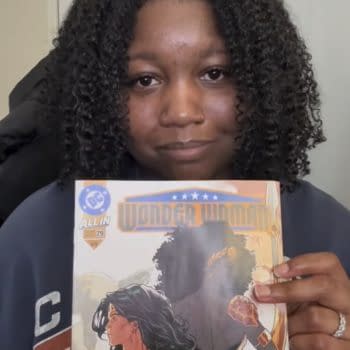Posted in: Look! It Moves! by Adi Tantimedh | Tagged: dollhouse, luthur arkwright
Look! It Moves! #10 by Adi Tantimedh – Flash-Forwards And Idiot Balls
A friend and I were discussing "Epitaph One", the unaired last episode of Joss Whedon's DOLLHOUSE that's included on the DVD set. The episode is an example of the "flash-forward" episode, where a show suddenly leaps far ahead of the series' present storylines to show or hint at the long-term outcomes of various characters and themes. I said that it didn't feel as fresh or unexpected as you might hope anymore, thanks to more than 20 years of flash-forwards being used in comics and TV writing.
This got me to thinking about the history of the Flash-forward plot. It usually works best with a story that's already been long-running in order for maximum dramatic impact. I remember as a kid, it was pretty mind-blowing when a flash-forward chapter or episode in a comic or show suddenly dropped and told us the characters were going to end up in places we hadn't expected. The first instance of a flash-forward I can recall was in Bryan Talbot's THE ADVENTURES OF LUTHER ARKWRIGHT, which had flash-forwards sprinkled throughout the story about future events the psychic hero was seeing and hints of his fate. Alan Moore played with flash-forwards in his early FUTURE SHOCKS for 2000AD, and his GREEN LANTERN CORPS back-ups stories (which now form the basis for the current comics' continuity) when he was paying his dues before taking Bryan Talbot's cue and took it further with Doctor Manhattan in WATCHMEN. Neil Gaiman would take up the pen and use flash-forwards throughout SANDMAN.
Flash-forwards began to take off on TV in the Nineties, usually on genre shows. It was BABYLON 5 that went whole-hog with its fourth season finale with flashes beyond the characters' future and into the universe's future. It's entirely possible Straczynski got the idea from reading the above comics, especially since he was friends with Gaiman and people like Harlan Ellison. From that point on, the gates were open. Joss Whedon, another comics fan, played with flash-forwards in BUFFY and ANGEL through plots involving prophecies. The STAR TREK shows would pop flash-forwards into their stories on a semi-regular basis, though they often turned out to be possible or alternate futures that the heroes had to prevent from occurring.
But what defines the flash-forward, as opposed to the Possible Future, is where the future being shown is one that is unavoidable, seemingly inevitable. What it does is get the audience interested in the journey to that future point, and sometimes the flashes of the future are only a hint of what's to come, and there's more after that point has been reached. LOST has devoted entire storylines and acts to the flash-forward, to the point where it's now a regular convention of the show. The momentum of the whole show is now based on racing towards the endgame of the future already foreseen in the flash-forwards. There's an undercurrent of fatalism in that, especially when I get the feeling the writers have been making it up as they go along to try to retcon out inconsistencies and continuity mistakes in past episodes. The problem with mainstream movies and TV is that once they hit upon a winning technique, they'll keep using it until they homogenize and dull it.
TV writers in Hollywood have a device they call "The Idiot Ball". "The Idiot Ball" is slang for when a character does something utterly stupid and counter to recognizable human psychology in order for the story to proceed, like not checking a suspect for weapons during a routine search or turning their back on someone who's clearly going to attack them. How aware writing staffs are about writing Idiot Balls varies from show to show. Some writers genuinely don't know better. Some writers just don't care as long as the draft gets approved and shot. Self-aware writing staffs will ask during their plotting sessions, "Who's got the Idiot Ball this week?" It's one thing for just one character to carry the Idiot Ball a week, and quite another when more than half the cast carry the Idiot Ball every week. Virtually every episode of HEROES is the Idiot Ball Olympics. And HEROES, unfortunately, has also regularly combined the characters carrying idiot balls with way too many flash-forward to undesirable futures to be avoided or averted to the point of tedium, and regularly has the heroes undoing the projected futures they witnessed in their flash-forwards to the point of total arbitrariness, not to mention bad storytelling. HEROES may have done more than any other show to kill the thrill of the flash-forward. Thanks, Idiot Balls.
So now, as a result of the common use of the flash-forward chapter in network TV, the technique is no longer as fresh or surprising as it was 20 years ago. It's just another commonplace instrument in the writer's toolbox. This means every writer from now on either has to use it sparingly or work their ass off to find an interesting way to use it instead of as a crutch to get them out of a narrative jam. Flash-forwards and Idiot Balls are a very bad combination. In fact, Idiot Balls are just a bad idea, period. They're lazy, dishonest and assumes the audience is stupid or desperately enough to swallow them without question.
I long for a return to the days when innovative and experimental storytelling came from comics before TV started to co-opt it, instead of vice-versa, which is what we have now. We lost something when comics stopped being fringe and entered show business mainstream. Everything loses its edge when it goes mainstream.
Busting Idiot Balls at lookitmoves@gmail.com
© Adisakdi Tantimedh











